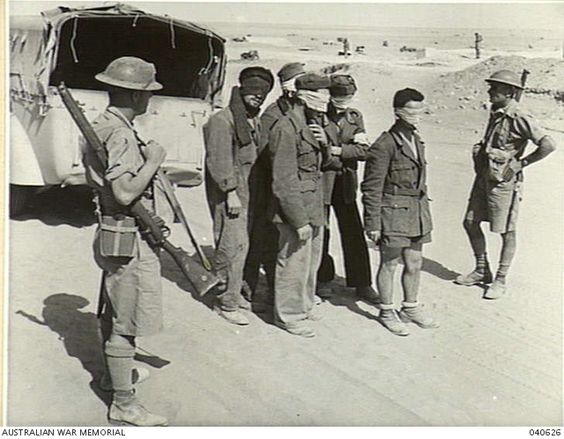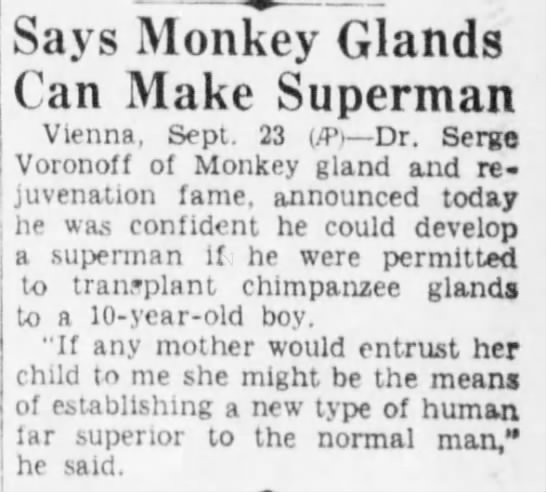Sunday 2 February 1941
 |
| Dr. Serge Voronoff at his monkey-gland laboratory in France. |
Italian forces in the area, however, remain unusually feisty for Italian troops of World War II. Thus, little profit appears likely from this commanding position in the area achieved by the Greek troops. Further progress may depend upon British troops, which remain in Egypt and Libya pending the completion of operations there and Greek approval to accept them. The RAF is busy in support of the Greeks. The Greeks are trying to take the strategically decisive port of Valona (Vlorë) quickly, and capture of the Trebeshinë heights is necessary to accomplish that. However, Klisura Pass is just the gateway toward Valona, not on its doorstep, and much work remains to be done (such as the capture of Tepelenë) before the port is even threatened, much less overcome.
With the benefit of hindsight and in light of later events (Operation Marita), the protracted defense of the Trebeshinë heights by two battalions of the Italian Blackshirts may be seen as having secured Valona and, thus, the entire Italian position in Albania for the duration of World War II. It salvages a tiny bit of Italian military honor. With the benefit of even more hindsight and perhaps a bit of arguable interpretation, the use of crack Cretan troops in Albania rather than keeping them in Crete may have contributed to future Allied defeats there as well.
Spinning things out a bit further.... perhaps beyond the breaking point... the successful Italian defense of the Trebeshinë heights may have played an even larger role in the outcome of World War II. If the Italians in Albania had folded completely in a short period of time, Hitler might not have authorized Operation Marita (at least partly intended to rescue the Italians). In that case, he might have had those troops available at the start of Operation Barbarossa. Many historians theorize that, had those troops been used in the Soviet Union right from the opening of hostilities, Moscow might have been captured before the winter snows and the entire course of world history altered. But, that is sheer speculation.
 |
| Map of initial attacks on Keren, Eritrea. |
Preliminary operations against Keren already are underway. Gazelle Force crosses the Baraka River with some difficulty (the Italians have blown the Ponte Mussolini bridge) and ascends toward the plateau. The British troops make it all the way to within about 6 km of Keren, where it is stopped at the Donglolaas Gorge. Normally, the area can be traversed without difficulty, but the Italians have dynamited the overhanging escarpments, filling the gorge with boulders and debris. The Italians also rather unhelpfully have mined the approaches.
In Abyssinia, the advancing South African troops capture Hobok.
European Air Operations: RAF Bomber Command begins a sustained campaign against the Channel invasion ports, in conjunction with Coastal Command. Among the targeted ports today are Berck, Le Havre, and Ostend. After dark, the RAF bombs Brest.
The Circus Operations continue. As opposed to Rhubarb missions, which are fighters only, the Circus missions include a token force of bombers to make their interception by the Luftwaffe more potentially profitable. This attack in the daylight is by five Blenheims against Boulogne. The British claim three fighters destroyed.
The Luftwaffe remains dormant. There are scattered raids over eastern England, with a few bombs dropped here and there.
Battle of the Atlantic: German battlecruisers Scharnhorst and Gneisenau, which have been in the far North Atlantic near Bear Island for several days waiting for the weather to improve, finally manage to complete refueling from tanker Adria. They each receive about 3400 tons of fuel and then quickly head to the southwest. Rather than head south of Iceland, as they did during their abortive breakout attempt in late January, the two ships head north of Iceland. Their objective is a passage through the Denmark Strait between Iceland and Greenland. Around this time, one of the Gneisenau's crewmen, named Liske, is lost overboard in the heavy seas and not recovered.
The Luftwaffe bombs and sinks 834-ton British freighter The Sultan in the outer fringes of the Thames Estuary. There are two deaths and 12 survivors.
Royal Navy 505 ton trawler HMT Almond hits a mine and sinks off Falmouth. All 19 onboard perish.
Belgian 168 ton coaster Pallieter (formerly Hero) has its cargo shift during a storm. This causes the ship to sink in the Firth of Forth.
The Luftwaffe attacks 5135-ton British freighter Waziristan in the Atlantic shipping lanes west of the Faroes Islands. A near miss disables the ship, which eventually is taken under tow by tug Bandit and brought to Kirkwall.
Convoy FN 398 departs from Southend, Convoy FS 402 departs from Methil, Convoy BS 14 departs from Suez.
U-431 is launched.
 |
| Italian POWs are being brought to the fortress area at Tobruk for processing, 1941 (Australian War Memorial). Tobruk serves as the embarkation point for Italian POWs heading for Alexandria. |
With Middle East Commander Archibald Wavell's permission in hand, General O'Connor of XIII Corps is preparing to send his armored forces south of the mountain (Jebel Akhdar, or Green Mountain) that bifurcates northeast Libyan operations. This requires supplies that must be shipped to Tobruk - not in perfect working order after the recent battles there - and then transport north toward Derna. O'Connor is torn between getting his supplies in order and then sending his troops (Combe Force) out fully prepared, or sending what he has available out quickly in order to increase the likelihood of blocking the Italian retreat.
O'Connor adopts the latter course. He orders Lieutenant Colonel J.F.B. Combe, commanding 11th Hussars, 2nd Rifle Brigade and assorted field, antitank and antiaircraft artillery) to set out first thing in the morning of the 3rd. The 7th Armoured Division will follow shortly thereafter. The basic plan is for the Australians to herd the Italians westward north of the mountain, while Combe Force moves directly westward and cuts them off further west. This unit becomes known as Combe Force.
Elsewhere, the Royal Navy is active. Operation Picket by Force H is launched from the aircraft carrier HMS Ark Royal. This is an attack by eight Skuas of RAF No. 810 Squadron on a strategically important San Chiara Ulla Dam at Lake Tirso, Sardinia. This attack, which aims to destroy hydroelectric facilities as well using torpedoes, is executed but does not damage the targets due to low clouds, hail, rain, antiaircraft fire, barking dogs and the whole lot. Four torpedoes are released, but apparently, they hit a sandbar or other obstruction. The British lose a Skua, with the three crewmen rescued by the Italians and taken prisoner. It is an interesting operation in the abstract, full of derring-do and the like, but results only in quite a bit of profitless effort on both ends of the Mediterranean.
Admiral Somerville still plans to carry off companion operation Operation Grog (formerly Result) (the bombardment of Genoa). However, he decides against it on this sortie due to the weather. Force H then retires to Gibraltar. Many lessons are learned from this somewhat embarrassing affair which is put to good use eventually in the famous "Dambusters" raid later in the war.
A diversionary operation for the disappointing Operation Picket and abortive Operation Result is underway in the eastern Mediterranean. In Operation MC 7, a large force of Royal Navy ships essentially simulates a typical convoy from Alexandria to Malta.
Italian tug Uso sinks between the islands of Korčula and Lastovo, Yugoslavia. The cause of sinking apparently is a mine; some accounts say it is by a torpedo, but the source of the supposed torpedo is not given. Sometimes, witnesses at the scene don't even know what happened and can only guess. Post-war record checks don't always resolve such issues.
In Malta, the government decides to set up a new department, the Food and Distributions Office. This office, under Marquis Barbaro of St George, will implement a rationing scheme. As part of this process, households will be issued rationing cards.
Wellingtons based on Malta attack Castel Benito, a Libyan airfield that the Italians enlarged in the late 1930s. This is but the latest in many air attacks on the field.
 |
| Keren, Eritrea, around the time of World War II. |
Royal Navy aircraft carrier HMS Formidable is on its way up the eastern African coast to join the Mediterranean Fleet at Alexandria. Its presence there is necessary to replace the battered HMS Illustrious, which is heading for permanent repairs in the United States (at some point the two carriers pass, which must give the boys on the Formidable quite an eyeful of what to expect for themselves). Today, it operates as part of Force K, a determined British effort to track down German raider Atlantis. While having no success in that mission, it is in the vicinity of Italian Somaliland (Somalia), and the British decide to take advantage of that fact. Formidable launches its Swordfish against Mogadishu harbor to lay mines. The nine Albacores then attack Mogadishu itself in Operation Breach.
Italian destroyers are operating in the Red Sea. After dark, they attack one of the BS convoys but are deterred by the Royal Navy escorts.
German battlecruiser Admiral Scheer transits from the Atlantic to the Indian Ocean.
Battle of the Pacific: German raider Orion completes an overhaul at Maug Island in the Marianas and heads for the Indian Ocean.
 |
| Dr. Voronoff claims that monkey glands may contain the secret to eternal youth. Brooklyn Daily Eagle, 13 July 1924. |
US Government: Dean Acheson is made Assistant Secretary of State.
Canada: Prime Minister William Mackenzie King makes a radio speech to the Canadian people. He states that the Germans are engaging in barbarity:
Total war means an indiscriminate attack on every front, by every means, however fiendish. Practiced by the [fascists], as we have seen, it is war against homes, hospitals, schools and churches. It is war on men, women and children.King emphasizes the importance of fully supporting the war effort. He informs the public that Canada will double the number of troops it already is contributing to the war effort in Europe.
Australia: Prime Minister Robert Menzies continues his epic journey from Melbourne to London, recorded in his voluminous diary (these entries most likely written on the plane). Today, he stops at Baghdad. He meets the Regent, who he describes as "clear-headed but only 25, afraid of his advisers." Menzies describes the new Iraqi Prime Minister as "a stop-gap, being a little better [than his predecessor] but not much." He then continues on to Jerusalem for the night.
China: The indeterminate fighting in Southern Honan (Henan) continues. The Japanese 11th Army evacuates Wuyang.
 |
| Dr. Voronoff claims that monkey glands may be able to create a race of supermen. Brooklyn Daily Eagle, 23 September 1936. |
Dr. Voronoff is the 74-year-old brother-in-law of the wife of ex-King Carol II of Romania. He has maintained a monkey farm and laboratory near Mentone for decades. He is a specialist in monkey glands, specifically, applied uses of monkey glands for medicinal purposes.
Now, monkey glands may not sound like a particularly exciting field. However, at this point in time, there are many hopes that monkey glands may have special powers. Specifically, there are claims that monkey glands are the fountain of youth. Dr. Voronoff does not mind the publicity, and in fact has made some wild claims of his own, reported in the international press, that monkey glands literally can create an army of supermen. And, in German hands, that would be an army of Wehrmacht Supermen.
Which means there may be something quite special about these particular monkeys. Who knows what... alterations the good doctor has made to them? It makes the otherwise inexplicable decision of the Germans to seize the monkeys quite explainable. As for Dr. Voronoff - he and his 26-year-old wife previously booked tickets to New York and arrived there on 6 September 1940.
Italian Homeland: Apparently as a result of reversals in Libya, Benito Mussolini declares southern Italy a war zone and places it under martial law.
 |
| Dr. Voronoff's monkeys seized; 2 February 1941 Brooklyn Daily Eagle. |
February 1941
February 1, 1941: US Military Reorganization
February 2, 1941: Wehrmacht Supermen
February 3, 1941: World Will Hold Its Breath
February 4, 1941: USO Forms
February 5, 1941: Hitler Thanks Irish Woman
February 6, 1941: Operation Sunflower
February 7, 1941: Fox Killed in the Open
February 8, 1941: Lend-Lease Passes House
February 9, 1941: Give Us The Tools
February 10, 1941: Operation Colossus
February 11, 1941: Afrika Korps
February 12, 1941: Rommel in Africa
February 13, 1941: Operation Composition
February 14, 1941: Nomura in Washington
February 15, 1941: Churchill's Warning
February 16, 1941: Operation Adolphus
February 17, 1941: Invade Ireland?
February 18, 1941: Panzerwaffe Upgrade
February 19, 1941: Three Nights Blitz
February 20, 1941: Prien's Farewell
February 21, 1941: Swansea Blitz Ends
February 22, 1941: Amsterdam Pogrom
February 23, 1941: OB-288 Convoy Destruction
February 24, 1941: Okuda Spies
February 25, 1941: Mogadishu Taken
February 26, 1941: OB-290 Convoy Destruction
February 27, 1941: Operation Abstention
February 28, 1941: Ariets Warns Stalin
2020














